常见的词语替换
词语替换.考试高分的关键!
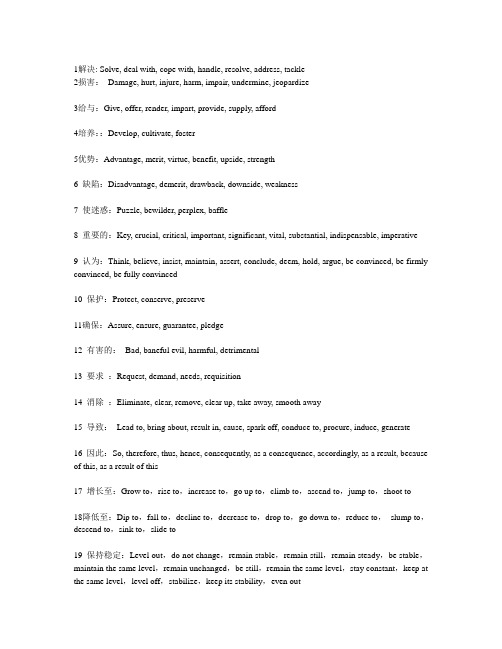
1解决: Solve, deal with, cope with, handle, resolve, address, tackle2损害:Damage, hurt, injure, harm, impair, undermine, jeopardize3给与:Give, offer, render, impart, provide, supply, afford4培养::Develop, cultivate, foster5优势:Advantage, merit, virtue, benefit, upside, strength6 缺陷:Disadvantage, demerit, drawback, downside, weakness7 使迷惑:Puzzle, bewilder, perplex, baffle8 重要的:Key, crucial, critical, important, significant, vital, substantial, indispensable, imperative9 认为:Think, believe, insist, maintain, assert, conclude, deem, hold, argue, be convinced, be firmly convinced, be fully convinced10 保护:Protect, conserve, preserve11确保:Assure, ensure, guarantee, pledge12 有害的:Bad, baneful evil, harmful, detrimental13 要求:Request, demand, needs, requisition14 消除:Eliminate, clear, remove, clear up, take away, smooth away15 导致:Lead to, bring about, result in, cause, spark off, conduce to, procure, induce, generate16 因此:So, therefore, thus, hence, consequently, as a consequence, accordingly, as a result, because of this, as a result of this17 增长至:Grow to,rise to,increase to,go up to,climb to,ascend to,jump to,shoot to18降低至:Dip to,fall to,decline to,decrease to,drop to,go down to,reduce to,slump to,descend to,sink to,slide to19 保持稳定:Level out,do not change,remain stable,remain still,remain steady,be stable,maintain the same level,remain unchanged,be still,remain the same level,stay constant,keep at the same level,level off,stabilize,keep its stability,even out20 急剧地:Dramatically,drastically,sharply,hugely,enormously,steeply,substantially,considerably,significantly,markedly,surprisingly,strikingly,radically,remarkably,vastly,noticeably21平稳地:Steadily,smoothly,slightly,slowly,marginally,gradually,moderately,mildly22 宣称:Allege, assert, declare, claim23 发生:Happen, occur, take place24 原因:Reason, factor, cause25 发展:Development, advance, progress26 有益的:Useful, helpful, beneficial, profitable, rewarding,advantageous27 影响:Influence, impact, effect28明显的:Clear, obvious, evident, self-evident, manifest, apparent, crystal-clear29占:Comprise, take up, account for, constitute, consist of, make up, occupy, hold, compose30与…相比:Compared with,compared to,in comparison with,in comparison to,by comparison with,by comparison to31对比而言:By contrast,in contrast,on the other hand,on the contrary=,conversely32展示:Show, reveal, illustrate, demonstrate, depict, present, represent, describe33 大约:Approximately,almost,about,around,nearly,roughly34波动:Fluctuate,go ups and downs,display a fluctuation,demonstrate a fluctuation35事实上:Practically,in practice,essentially,in essence,in reality,in effect,in fact,as a matter of fact,it is a fact that36 换言之:Namely,that is to say,in other words,to put it like this,to put it differently,to put it from another way,to put it from another angle.力拔山兮气盖世,时不利兮骓不逝。
连接词和常用词语替换词
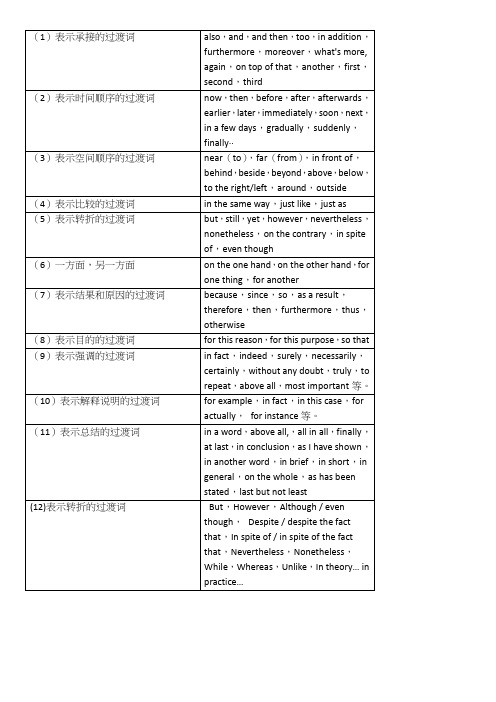
Dangerous
perilous, breakneck, chancy (informal), hazardous, insecure, precarious, risky, unsafe, vulnerable
Then
subsequently, afterward, thereafter, after that, succeeding (adj.), secondarily, what is more, furthermore (further more)…
Lastly
ultimately, eventually, in conclusion, to conclude, as a final point, last of all, last but not least, finally…
indispensable, requisite, critical, fundamental, primary, elementary,
underlying, rudimentary, basically, necessary…
Big
gigantic, massive, colossal, enormous, immense, gargantuan,
Beautiful
charming, charismatic, attractive, gorgeous, pretty, endearing, sweet,
adorable, eye-catching, hot, cute, good-looking, lovable, engaging…
高考英语写作常见40组同义替换清单

高考英语写作常见40组同义替换养成良好的答题习惯,是决定高考英语成败的决定性因素之一。
做题前,要认真阅读题目要求、题干和选项,并对答案内容作出合理预测;答题时,切忌跟着感觉走,最好按照题目序号来做,不会的或存在疑问的,要做好标记,要善于发现,找到题目的题眼所在,规范答题,书写工整;答题完毕时,要认真检查,查漏补缺,纠正错误。
对高三学生而言,就是要通过训练转化为学生的答题能力。
一是严格限时训练。
限时训练就是让学生在规定时间内做完训练题目,既训练速度,又锻炼准确度。
限时训练可短可长,可以是课前十分钟,可以是一节课,但必须坚决做到即练即评,长期坚持,通过教师评阅提升学生答题速度和效度,做到日日清,周周清,月月清,适应高考临场答题要求。
二是严格规范答题。
要认真研究高考原题和高考答案,根据学生的答题情况认真进行比对。
要把学生在考试时的原生态答卷原汁原味地展示出来,再让学生自己对照答案进行打分、评价,找出与标准答案的差距,小组内相互交流、讨论,制定答题标准模板,保证将来一分不丢。
三是突出变式训练。
对于临界生的典型错题或遗漏知识点,要进行变式训练,一题多变进行训练,把错题作为“母题”,至少进行一题五变以上,让学生写出每道题的解题思路,最后总结出此类变式的特点和解题入手点。
教师必须要把变式训练当做作业认真批改,带领学生共同验证解题思路,形成答题的基本思路。
四是落实“作业自助餐”。
对学生要进行分类指导,不能一刀切,尤其是对于清北临界生和一本临界生,学校应高度重视临界生转化工作。
要把握好临界生的学科短板,制定好辅导、转化和提升的具体措施,要实行面批面改,落实“作业自助餐”。
针对不同的高频错题,由教师分别独立设置变式训练题,也就是A错题出至少5道变式训练,独立印刷;B错题再出5道变式训练,独立印刷;C错题也出5道变式训练,独立印刷;学生可以根据自己的错题,自主领取对应的变式训练题,通过针对性训练补齐学科或知识短板,提升整体备考效益。
掌握改写句子的技巧与方法

掌握改写句子的技巧与方法语文学习中,改写句子是培养学生语言表达能力和思维灵活性的重要环节。
通过改写句子,学生能够加深对语法规则的理解,提高语言表达的准确性和多样性。
本文将介绍一些改写句子的技巧与方法,帮助学生在语文学习中更好地掌握这一技能。
一、句型转换句型转换是改写句子的常用方法之一。
在句型转换中,学生需要根据句子的语义和语法规则进行转换,使句子的表达方式更加丰富多样。
以下是一些常见的句型转换方法:1. 主动语态与被动语态的转换:通过改变动词形式和语态,将主动语态的句子改写为被动语态,或将被动语态的句子改写为主动语态。
例如:原句:小明打破了花瓶。
改写:花瓶被小明打破了。
2. 直接引语与间接引语的转换:通过改变句子的引用方式,将直接引语改写为间接引语,或将间接引语改写为直接引语。
例如:原句:小明说:“我喜欢读书。
”改写:小明说他喜欢读书。
3. 疑问句与陈述句的转换:通过改变句子的语序和标点符号,将疑问句改写为陈述句,或将陈述句改写为疑问句。
例如:原句:你是不是喜欢吃苹果?改写:你喜欢吃苹果吗?二、词语替换词语替换是改写句子的另一种常用方法。
通过替换句子中的某些词语,可以使句子的意思保持不变,但表达方式更加丰富。
以下是一些常见的词语替换方法:1. 同义词替换:将句子中的某个词语替换为与其意思相近的同义词,使句子的表达更加准确。
例如:原句:小狗在院子里玩耍。
改写:小狗在院子里嬉戏。
2. 反义词替换:将句子中的某个词语替换为与其意思相反的反义词,使句子的表达更加鲜明。
例如:原句:他很高兴地接受了邀请。
改写:他欣然接受了邀请。
3. 近义词替换:将句子中的某个词语替换为与其意思相近的近义词,使句子的表达更加多样。
例如:原句:这个问题很困难。
改写:这个问题很难。
三、句子重组句子重组是通过改变句子成分的顺序或结构,使句子的表达方式更加灵活多样的方法。
以下是一些常见的句子重组方法:1. 成分前置:将句子中的某个成分提前,使句子的重点更加突出。
常用词语高级替换名词 (1)
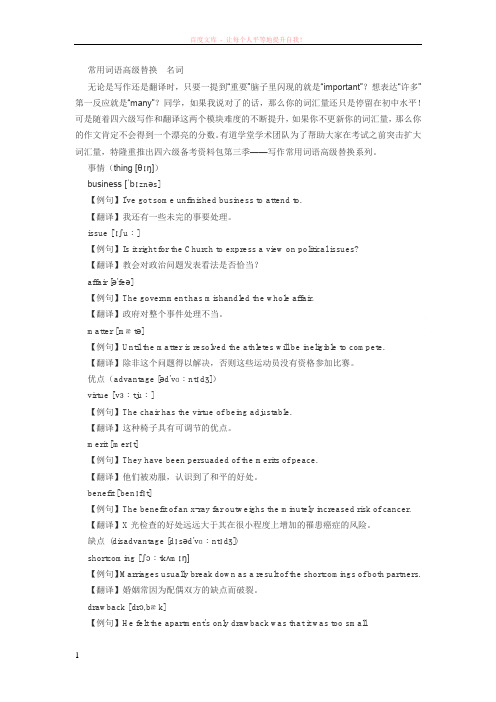
常用词语高级替换名词无论是写作还是翻译时,只要一提到“重要”脑子里闪现的就是“important”?想表达“许多”第一反应就是“many”?同学,如果我说对了的话,那么你的词汇量还只是停留在初中水平!可是随着四六级写作和翻译这两个模块难度的不断提升,如果你不更新你的词汇量,那么你的作文肯定不会得到一个漂亮的分数。
有道学堂学术团队为了帮助大家在考试之前突击扩大词汇量,特隆重推出四六级备考资料包第三季——写作常用词语高级替换系列。
事情(thing [θɪŋ])business [ˈbɪznəs]【例句】I've got some unfinished business to attend to.【翻译】我还有一些未完的事要处理。
issue ['ɪʃuː]【例句】Is it right for the Church to express a view on political issues?【翻译】教会对政治问题发表看法是否恰当?affair [ə'feə]【例句】The government has mishandled the whole affair.【翻译】政府对整个事件处理不当。
matter ['mætə]【例句】Until the matter is resolved the athletes will be ineligible to compete.【翻译】除非这个问题得以解决,否则这些运动员没有资格参加比赛。
优点(advantage [əd'vɑːntɪdʒ])virtue ['vɜːtjuː]【例句】The chair has the virtue of being adjustable.【翻译】这种椅子具有可调节的优点。
merit ['merɪt]【例句】They have been persuaded of the merits of peace.【翻译】他们被劝服,认识到了和平的好处。
增进感情的高级替换词
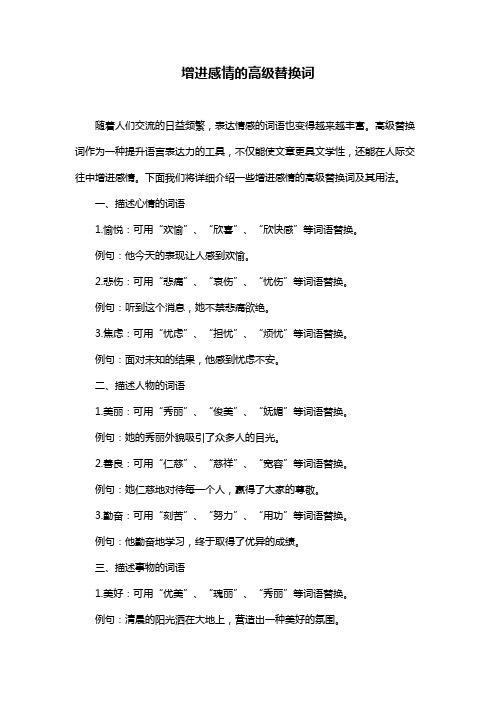
增进感情的高级替换词随着人们交流的日益频繁,表达情感的词语也变得越来越丰富。
高级替换词作为一种提升语言表达力的工具,不仅能使文章更具文学性,还能在人际交往中增进感情。
下面我们将详细介绍一些增进感情的高级替换词及其用法。
一、描述心情的词语1.愉悦:可用“欢愉”、“欣喜”、“欣快感”等词语替换。
例句:他今天的表现让人感到欢愉。
2.悲伤:可用“悲痛”、“哀伤”、“忧伤”等词语替换。
例句:听到这个消息,她不禁悲痛欲绝。
3.焦虑:可用“忧虑”、“担忧”、“烦忧”等词语替换。
例句:面对未知的结果,他感到忧虑不安。
二、描述人物的词语1.美丽:可用“秀丽”、“俊美”、“妩媚”等词语替换。
例句:她的秀丽外貌吸引了众多人的目光。
2.善良:可用“仁慈”、“慈祥”、“宽容”等词语替换。
例句:她仁慈地对待每一个人,赢得了大家的尊敬。
3.勤奋:可用“刻苦”、“努力”、“用功”等词语替换。
例句:他勤奋地学习,终于取得了优异的成绩。
三、描述事物的词语1.美好:可用“优美”、“瑰丽”、“秀丽”等词语替换。
例句:清晨的阳光洒在大地上,营造出一种美好的氛围。
2.丰富:可用“繁多”、“多样”、“丰富多采”等词语替换。
例句:这场音乐会节目丰富多样,让观众陶醉其中。
3.独特:可用“独具特色”、“别具一格”、“与众不同”等词语替换。
例句:这座古建筑独具特色,吸引了无数游客前来欣赏。
四、描述地点的词语1.宽敞:可用“宽阔”、“宏大”、“宽敞明亮”等词语替换。
例句:新装修的会议室宽敞明亮,让人心情愉悦。
2.宁静:可用“安静”、“幽静”、“恬静”等词语替换。
例句:清晨的公园里,一片宁静,让人心旷神怡。
3.优美:可用“美丽”、“秀丽”、“雅致”等词语替换。
例句:湖边的风景优美,是个休闲的好去处。
总之,高级替换词在丰富我们的语言表达的同时,还能增进人与人之间的感情。
四六级写作常用词语高级替换词(三)(贬义形容词)
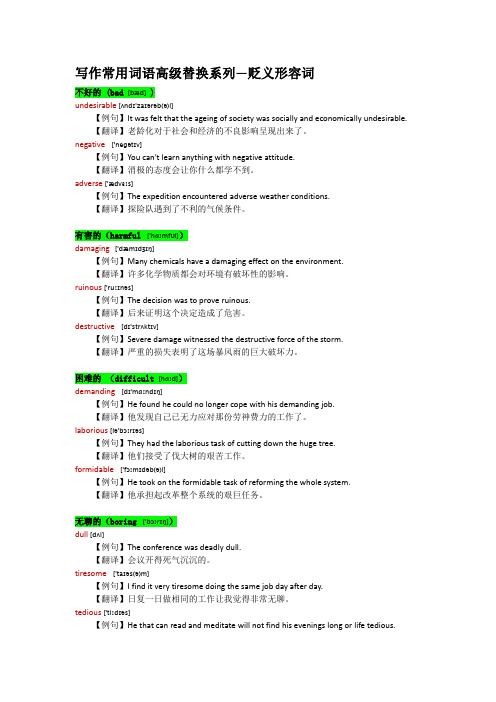
写作常用词语高级替换系列—贬义形容词不好的 (bad[bæd])undesirable [ʌndɪ'zaɪərəb(ə)l]【例句】It was felt that the ageing of society was socially and economically undesirable.【翻译】老龄化对于社会和经济的不良影响呈现出来了。
negative ['negətɪv]【例句】You can't learn anything with negative attitude.【翻译】消极的态度会让你什么都学不到。
adverse ['ædvɜːs]【例句】The expedition encountered adverse weather conditions.【翻译】探险队遇到了不利的气候条件。
有害的(harmful ['hɑːmfʊl])damaging ['dæmɪdʒɪŋ]【例句】Many chemicals have a damaging effect on the environment.【翻译】许多化学物质都会对环境有破坏性的影响。
ruinous['ruːɪnəs]【例句】The decision was to prove ruinous.【翻译】后来证明这个决定造成了危害。
destructive [dɪ'strʌktɪv]【例句】Severe damage witnessed the destructive force of the storm.【翻译】严重的损失表明了这场暴风雨的巨大破坏力。
困难的(difficult [hɑːd])demanding [dɪ'mɑːndɪŋ]【例句】He found he could no longer cope with his demanding job.【翻译】他发现自己已无力应对那份劳神费力的工作了。
最全的词语大全(辨析、替换、选词)

最全的词语大全(辨析、替换、选词)近义词辨析大全 (1)近义词解析大汇总 (22)选词填空(230题) (96)选词填空大全 (172)近义词辨析大全暧昧:含糊、不明朗,不光明磊落,不便告人。
暗昧:同“暧昧”。
还可表示不聪明,愚昧。
暴发:突然猛烈的发生或以不正当的手段发财。
如山洪、流行病、雪崩。
爆发:由于爆炸而突发或发生重大事变。
如战争、火山、革命、大笑。
辨正:辨明是非,纠正谬误。
如“辨正发音”,可写作“辩正”。
辨证:辨析考证,如“经学者多方辨证”。
亦为中医术语,“辨证医治”。
辩证:哲学术语,如“辩证唯物主义”。
亦同“辨证”第一义。
哺养:喂养,使长大。
抚养:抚育、照料并教养。
不至[不至于]:不会达到某种程度,如“决不至于不知道”。
不致[不致于]:不会引发某种后果,如“决不致犯错误”。
苍茫:多指夜色、水域、大地等旷远、迷茫。
引申为模糊不清。
苍莽:多指树林、山岭、大地等广阔无边。
引申为意境心胸开阔。
长年:一年到头,整年。
如“长年积雪”、“长年劳作”。
常年:终年、常期,如“常年坚持体育活动”。
平常年份,如“常年产量200斤”。
陈规:过时的、不适用的规章制度,如“陈规陋习”。
成规:现行或行之已久的规则、方法,如“墨守成规”。
弛缓:放松、缓和,如“紧张的情绪慢慢~~下来。
迟缓:缓慢,与”迅速”相对,如“~ ~地迈着步子”。
处世:指人事交往、参加社会活动,“~ 稳健”、“为人~”。
处事:办事、处理事务,如“~ 认真,从不马虎”。
醇厚:口味纯正浓厚;亦用于人的品质或风俗,此时同“淳厚”。
淳厚[纯厚]:只指品质风俗质朴敦厚。
伺候[ci.hou]:可用于人,不分地位高低;也可用于牲畜等。
侍候:用于对长辈或地位高者。
窜改:对文本、文件、成语、古籍等的改动。
篡改:用作伪的手段改动历史、理论、政策等。
度过:用于时间方面。
渡过:用于有水面的空间;难点、危机、困难时期。
法制:名词,法律制度。
法治:名词或动词,依法终古治国的思想、方法妨害:使受损害。
常见词语替换大全
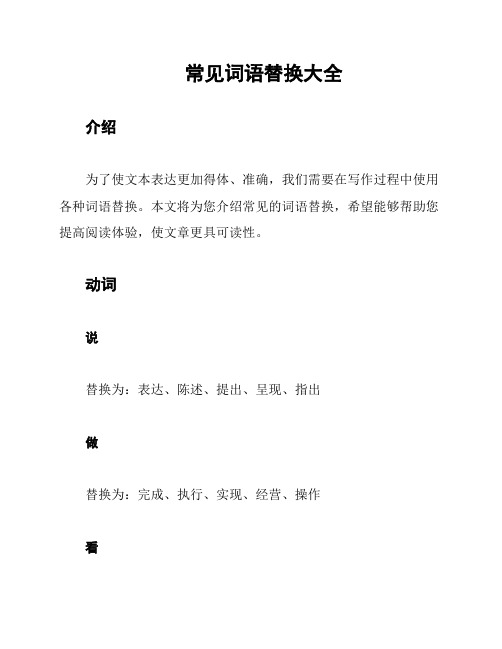
常见词语替换大全
介绍
为了使文本表达更加得体、准确,我们需要在写作过程中使用各种词语替换。
本文将为您介绍常见的词语替换,希望能够帮助您提高阅读体验,使文章更具可读性。
动词
说
替换为:表达、陈述、提出、呈现、指出
做
替换为:完成、执行、实现、经营、操作
看
替换为:观察、察看、瞥见、窥视、浏览明白
替换为:懂得、领会、了解、知晓、理解喜欢
替换为:爱好、钟爱、青睐、欣赏、喜爱名词
人
替换为:个人、民众、公众、职员、市民事情
替换为:事件、事项、事务、事态、情况
问题
替换为:难题、困境、疑问、难点、难处优点
替换为:优势、长处、益处、长项、优越性缺点
替换为:不足、欠缺、瑕疵、缺损、缺陷形容词
好
替换为:优秀、出色、精彩、正面、顶尖不好
替换为:糟糕、糟透、缺失、差劣、低劣
容易
替换为:轻松、简易、妥当、顺畅、安逸
困难
替换为:艰苦、艰难、费力、不易、难以
漂亮
替换为:美丽、绝色、秀丽、美观、动人
结论
以上就是常见词语替换的介绍,尽管词语替换可以让文章表达更加得体、准确,但过度替换也会影响文章的连贯度。
因此,在写作过程中请慎重使用词语替换,并根据具体情况使用适当的替换词语。
常用词语替换

1. 贫穷的:poor = needy = impoverished = poverty-stricken2. 富裕的:rich = wealthy = affluent = well-to-do = well-off3. 优秀的:excellent = eminent = top = outstanding4. 积极的,好的:good = conducive = beneficial=advantageous5. 消极的,不良的:bad = detrimental= baneful =undesirable6. 明显的:obvious = apparent = evident =manifest7. 健康的: healthy = robust = sound = wholesome8. 惊人的:surprising = amazing = extraordinary = miraculous9. 美丽的:beautiful = attractive = gorgeous = eye-catching10. 有活力的:energetic = dynamic = vigorous =animated11. 流行的:popular = prevailing = prevalent= pervasive★动词:1. 提高,加强:improve = enhance= promote = strengthen = optimize2. 引起:cause = trigger = endanger3. 解决:solve =resolve =address = tackle =cope with = deal with4. 拆除:destroy = tear down = knock down = eradicate5. 培养: develop = cultivate = foster = nurture6. 激发,鼓励:encourage = motivate = stimulate = spur7. 认为:think = assert= hold = claim = argue8. 完成:complete = fulfill = accomplish= achieve9. 保留:keep = preserve = retain = hold10. 有害于:destroy = impair = undermine = jeopardize11. 减轻: ease = alleviate = relieve = lighten★名词:1. 影响:influence= impact2. 危险:danger = perils =hazard3. 污染:pollution = contamination4. 人类:human beings= mankind = human race5. 老人:old people= the old = the elderly = the aged = senior citizens6. 幸福:happiness = cheerfulness = well-being7. 老师:teachers = instructors = educators = lecturers8. 教育:education = schooling = family parenting = upbringing9. 青少年:young people = youngsters = youths = adolescents10. 优点:advantage = merits = superiority = virtue11. 责任:responsibility = obligation = duty = liability12. 能力:ability = capacity = power = skill13. 职业:job = career = employment = profession14. 娱乐:enjoyment = pastimes = recreation= entertainment15. 孩子:children = offspring = descendant= kid1. 充满了:be filled with = be awash with = be inundate with = be saturated with2. 努力:struggle for = aspire after = strive for = spare no efforts for3. 从事:embark on = take up = set about = go in for4. 在当代: in contemporarysociety = in present-day society= in this day and age5. 大量的: a host of = a multitude of = a vast number of = a vast amount of。
让写作加分的词语替换及解释
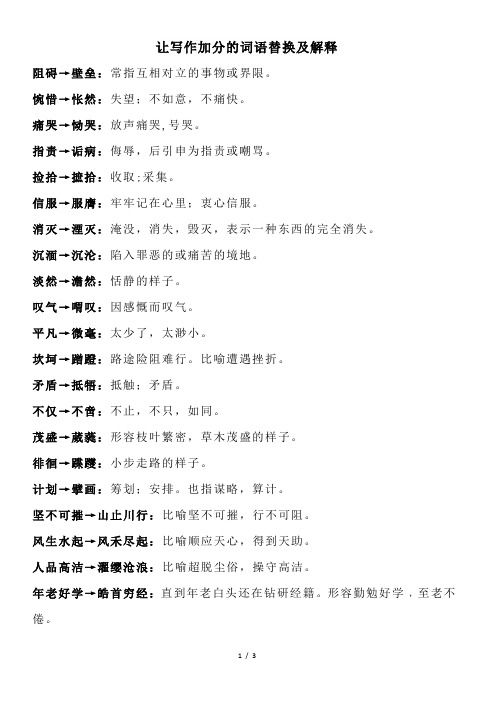
让写作加分的词语替换及解释阻碍→壁垒:常指互相对立的事物或界限。
惋惜→怅然:失望;不如意,不痛快。
痛哭→恸哭:放声痛哭,号哭。
指责→诟病:侮辱,后引申为指责或嘲骂。
捡拾→摭拾:收取;采集。
信服→服膺:牢牢记在心里;衷心信服。
消灭→湮灭:淹没,消失,毁灭,表示一种东西的完全消失。
沉湎→沉沦:陷入罪恶的或痛苦的境地。
淡然→澹然:恬静的样子。
叹气→喟叹:因感慨而叹气。
平凡→微毫:太少了,太渺小。
坎坷→蹭蹬:路途险阻难行。
比喻遭遇挫折。
矛盾→抵牾:抵触;矛盾。
不仅→不啻:不止,不只,如同。
茂盛→葳蕤:形容枝叶繁密,草木茂盛的样子。
徘徊→蹀躞:小步走路的样子。
计划→擘画:筹划;安排。
也指谋略,算计。
坚不可摧→山止川行:比喻坚不可摧,行不可阻。
风生水起→风禾尽起:比喻顺应天心,得到天助。
人品高洁→濯缨沧浪:比喻超脱尘俗,操守高洁。
年老好学→皓首穷经:直到年老白头还在钻研经籍。
形容勤勉好学﹐至老不倦。
春华吐艳→寒木春华:指寒木不凋、春花吐艳。
比喻各有所长。
放眼当下→揆诸当下:思考现在这一时刻。
秋天大海→秋空霁海:秋天的天空和平静的海波。
光照万物→霁虹日晞:雨停了,天空放晴了,太阳光照耀晒干了刚被雨水湿润的万物。
岁月变迁→星燧贸迁:比喻岁月变迁。
满腔赤诚→披沥赤忱:指表露非常真诚的心意。
美好言行→嘉言懿行:美好的言行。
漂泊不定→浪萍风梗:浪中之浮萍,风中之断梗。
形容人漂泊不定。
飘忽如梦→流绪微梦:是指一种轻忽飘渺的情感,就好像流动的思绪,细微的梦。
嫁祸于人→以邻为壑:比喻只顾自己的利益,把困难、灾祸等转嫁给别人。
不值一提→不值一哂:不值得一笑。
比喻毫无价值。
未雨绸缪→曲突徙薪:比喻消除可能导致事故发生的因素,防患于未然。
广受好评→口碑载道:群众的称颂一路上都能听得到。
形容到处受人称赞。
消除误会→涣然冰释:消失得像冰块消融一样。
比喻疑虑、误会、隔阂完全消除。
所言极是→斯言灼灼:形容人们说话有条理,有底气。
举一反三→一隅三反:从一件事物的情况、道理类推而知道许多事物的情况、道理。
英语作文 常用形容词、动词替换

还有一个表达情感时的词语替换表:另外,写文章时要保证自己传达给读者的信息是自信的,因此不要用I think 或I believe 之类。
如果事实如此,那么相信前文已经给出了足够的暗示与证明,用这样的表达只会显示出作者没底气。
除此之外,回答者还按字母顺序给出了常见词语的替换,对于写文章或是日常交流都非常有帮助:Amazing —incredible, unbelievable, improbable, fabulous, wonderful, fantastic, astonishing, astounding, extraordinaryAnger —enrage, infuriate, arouse, nettle, exasperate, inflame, maddenAngry —mad, furious, enraged, excited, wrathful, indignant, exasperated, aroused, inflamedAnswer—reply, respond, retort, acknowledgeAsk- —question, inquire of, seek information from, put a question to, demand, request, expect, inquire, query, interrogate, examine, quizAwful—dreadful, terrible, abominable, bad, poor, unpleasantBad—evil, immoral, wicked, corrupt, sinful, depraved, rotten, contaminated, spoiled, tainted, harmful, injurious, unfavorable, defective, inferior, imperfect, substandard, faulty, improper, inappropriate, unsuitable, disagreeable, unpleasant, cross, nasty, unfriendly, irascible, horrible, atrocious, outrageous, scandalous, infamous, wrong, noxious, sinister, putrid, snide, deplorable, dismal, gross, heinous, nefarious, base, obnoxious, detestable, despicable, contemptible, foul, rank, ghastly, execrableBeautiful—pretty, lovely, handsome, attractive, gorgeous, dazzling, splendid, magnificent, comely, fair, ravishing, graceful, elegant, fine, exquisite, aesthetic, pleasing, shapely, delicate, stunning, glorious, heavenly, resplendent, radiant, glowing, blooming, sparklingBegin—start, open, launch, initiate, commence, inaugurate, originate Big—enormous, huge, immense, gigantic, vast, colossal, gargantuan, large, sizable, grand, great, tall, substantial, mammoth, astronomical, ample, broad, expansive, spacious, stout, tremendous, titanic, mountainousBrave—courageous, fearless, dauntless, intrepid, plucky, daring, heroic, valorous, audacious, bold, gallant, valiant, doughty, mettlesomeBreak —fracture, rupture, shatter, smash, wreck, crash, demolish, atomize Bright—shining, shiny, gleaming, brilliant, sparkling, shimmering, radiant, vivid, colorful, lustrous, luminous, incandescent, intelligent, knowing, quick-witted, smart, intellectualCalm—quiet, peaceful, still, tranquil, mild, serene, smooth, composed, collected, unruffled, level-headed, unexcited, detached, aloofCome—approach, advance, near, arrive, reachCool—chilly, cold, frosty, wintry, icy, frigidCrooked—bent, twisted, curved, hooked, zigzagCry—shout, yell, yowl, scream, roar, bellow, weep, wail, sob, bawl Cut—gash, slash, prick, nick, sever, slice, carve, cleave, slit, chop, crop, lop, reduce Dangerous—perilous, hazardous, risky, uncertain, unsafeDark—shadowy, unlit, murky, gloomy, dim, dusky, shaded, sunless, black, dismal, sadDecide—determine, settle, choose, resolveDefinite—certain, sure, positive, determined, clear, distinct, obvious Delicious—savory, delectable, appetizing, luscious, scrumptious, palatable, delightful, enjoyable, toothsome, exquisiteDescribe—portray, characterize, picture, narrate, relate, recount, represent, report, recordDestroy—ruin, demolish, raze, waste, kill, slay, end, extinguish Difference—disagreement, inequity, contrast, dissimilarity, incompatibility Do—execute, enact, carry out, finish, conclude, effect, accomplish, achieve, attain Dull—boring, tiring…tiresome, uninteresting, slow, dumb, stupid, unimaginative, lifeless, dead, insensible, tedious, wearisome, listless, expressionless, plain, monotonous, humdrum, drearyEager—keen, fervent, enthusiastic, involved, interested, alive toEnd—stop, finish, terminate, conclude, close, halt, cessation, discontinuance Enjoy —appreciate, delight in, be pleased, indulge in, luxuriate in, bask in, relish, devour, savor, likeExplain—elaborate, clarify, define, interpret, justify, account forFair—just, impartial, unbiased, objective, unprejudiced, honestFall —drop, descend, plunge, topple, tumbleFalse —fake, fraudulent, counterfeit, spurious, untrue, unfounded, erroneous, deceptive, groundless, fallaciousFamous —well-known, renowned, celebrated, famed, eminent, illustrious, distinguished, noted, notoriousFast —quick, rapid, speedy, fleet, hasty, snappy, mercurial, swiftly, rapidly, quickly, snappily, speedily, lickety-split, posthaste, hastily, expeditiously, like a flashFat —stout, corpulent, fleshy, beefy, paunchy, plump, full, rotund, tubby, pudgy, chubby, chunky, burly, bulky, elephantineFear —fright, dread, terror, alarm, dismay, anxiety, scare, awe, horror, panic, apprehensionFly —soar, hover, flit, wing, flee, waft, glide, coast, skim, sail, cruiseFunny —humorous, amusing, droll, comic, comical, laughable, sillyGet —acquire, obtain, secure, procure, gain, fetch, find, score, accumulate, win, earn, rep, catch, net, bag, derive, collect, gather, glean, pick up, accept, come by, regain, salvageGo —recede, depart, fade, disappear, move, travel, proceedGood —excellent, fine, superior, wonderful, marvelous, qualified, suited, suitable, apt, proper, capable, generous, kindly, friendly, gracious, obliging, pleasant, agreeable, pleasurable, satisfactory, well-behaved, obedient, honorable, reliable, trustworthy, safe, favorable, profitable, advantageous, righteous, expedient, helpful, valid, genuine, ample, salubrious, estimable, beneficial, splendid, great, noble, worthy, first-rate, top-notch, grand, sterling, superb, respectable, edifying【英国留学申请、英国院校信息私信@英国院校那些事;留学免费评估链接戳置顶微博】Great —noteworthy, worthy, distinguished, remarkable, grand, considerable, powerful, much, mightyGross —improper, rude, coarse, indecent, crude, vulgar, outrageous, extreme, grievous, shameful, uncouth, obscene, lowHappy —pleased, contented, satisfied, delighted, elated, joyful, cheerful, ecstatic, jubilant, gay, tickled, gratified, glad, blissful, overjoyedHate —despise, loathe, detest, abhor, disfavor, dislike, disapprove, abominate Have—hold, possess, own, contain, acquire, gain, maintain, believe, bear, beget, occupy, absorb, fill, enjoyHelp —aid, assist, support, encourage, back, wait on, attend, serve, relieve, succor, benefit, befriend, abetHide —conceal, cover, mask, cloak, camouflage, screen, shroud, veilHurry —rush, run, speed, race, hasten, urge, accelerate, bustleHurt —damage, harm, injure, wound, distress, afflict, painIdea —thought, concept, conception, notion, understanding, opinion, plan, view, beliefImportant —necessary, vital, critical, indispensable, valuable, essential, significant, primary, principal, considerable, famous, distinguished, notable, well-known Interesting —fascinating, engaging, sharp, keen, bright, intelligent, animated, spirited, attractive, inviting, intriguing, provocative, though-provoking, challenging, inspiring, involving, moving, titillating, tantalizing, exciting, entertaining, piquant, lively, racy, spicy, engrossing, absorbing, consuming, gripping, arresting, enthralling, spellbinding, curious, captivating, enchanting, bewitching, appealingKeep —hold, retain, withhold, preserve, maintain, sustain, supportKill —slay, execute, assassinate, murder, destroy, cancel, abolishLazy —indolent, slothful, idle, inactive, sluggishLittle —tiny, small, diminutive, shrimp, runt, miniature, puny, exiguous, dinky, cramped, limited, itsy-bitsy, microscopic, slight, petite, minuteLook —gaze, see, glance, watch, survey, study, seek, search for, peek, peep, glimpse, stare, contemplate, examine, gape, ogle, scrutinize, inspect, leer, behold, observe, view, witness, perceive, spy, sight, discover, notice, recognize, peer, eye, gawk, peruse, exploreLove —like, admire, esteem, fancy, care for, cherish, adore, treasure, worship, appreciate, savorMake —create, originate, invent, beget, form, construct, design, fabricate, manufacture, produce, build, develop, do, effect, execute, compose, perform, accomplish, earn, gain, obtain, acquire, getMark —label, tag, price, ticket, impress, effect, trace, imprint, stamp, brand, sign, note, heed, notice, designateMischievous —prankish, playful, naughty, roguish, waggish, impish, sportive Move —plod, go, creep, crawl, inch, poke, drag, toddle, shuffle, trot, dawdle, walk, traipse, mosey, jog, plug, trudge, slump, lumber, trail, lag, run, sprint, trip, bound, hotfoot, high-tail, streak, stride, tear, breeze, whisk, rush, dash, dart, bolt, fling, scamper, scurry, skedaddle, scoot, scuttle, scramble, race, chase, hasten, hurry,hump, gallop, lope, accelerate, stir, budge, travel, wander, roam, journey, trek, ride, spin, slip, glide, slide, slither, coast, flow, sail, saunter, hobble, amble, stagger, paddle, slouch, prance, straggle, meander, perambulate, waddle, wobble, pace, swagger, promenade, lunge【英国留学申请、英国院校信息私信@英国院校那些事;留学免费评估链接戳置顶微博】Moody —temperamental, changeable, short-tempered, glum, morose, sullen, mopish, irritable, testy, peevish, fretful, spiteful, sulky, touchyNeat —clean, orderly, tidy, trim, dapper, natty, smart, elegant, well-organized, super, desirable, spruce, shipshape, well-kept, shapelyNew —fresh, unique, original, unusual, novel, modern, current, recentOld —feeble, frail, ancient, weak, aged, used, worn, dilapidated, ragged, faded, broken-down, former, old-fashioned, outmoded, passe, veteran, mature, venerable, primitive, traditional, archaic, conventional, customary, stale, musty, obsolete, extinctPart —portion, share, piece, allotment, section, fraction, fragmentPlace —space, area, spot, plot, region, location, situation, position, residence, dwelling, set, site, station, status, statePlan —plot, scheme, design, draw, map, diagram, procedure, arrangement, intention, device, contrivance, method, way, blueprintPopular —well-liked, approved, accepted, favorite, celebrated, common, currentPredicament —quandary, dilemma, pickle, problem, plight, spot, scrape, jamPut —place, set, attach, establish, assign, keep, save, set aside, effect, achieve, do, buildQuiet —silent, still, soundless, mute, tranquil, peaceful, calm, restfulRight —correct, accurate, factual, true, good, just, honest, upright, lawful, moral, proper, suitable, apt, legal, fairRun —race, speed, hurry, hasten, sprint, dash, rush, escape, elope, fleeSay/Tell—inform, notify, advise, relate, recount, narrate, explain, reveal, disclose, divulge, declare, command, order, bid, enlighten, instruct, insist, teach, train, direct, issue, remark, converse, speak, affirm, suppose, utter, negate, express, verbalize, voice, articulate, pronounce, deliver, convey, impart, assert, state, allege, mutter, mumble, whisper, sigh, exclaim, yell, sing, yelp, snarl, hiss, grunt, snort, roar, bellow, thunder, boom, scream, shriek, screech, squawk, whine, philosophize, stammer, stutter, lisp, drawl, jabber, protest, announce, swear, vow, content, assure, deny, disputeScared —afraid, frightened, alarmed, terrified, panicked, fearful, unnerved, insecure, timid, shy, skittish, jumpy, disquieted, worried, vexed, troubled, disturbed, horrified, terrorized, shocked, petrified, haunted, timorous, shrinking, tremulous, stupefied, paralyzed, stunned, apprehensiveShow —display, exhibit, present, note, point to, indicate, explain, reveal, prove, demonstrate, exposeSlow —unhurried, gradual, leisurely, late, behind, tedious, slackStop —cease, halt, stay, pause, discontinue, conclude, end, finish, quitStory —tale, myth, legend, fable, yarn, account, narrative, chronicle, epic, sage, anecdote, record, memoirStrange —odd, peculiar, unusual, unfamiliar, uncommon, queer, weird, outlandish, curious, unique, exclusive, irregularTake —hold, catch, seize, grasp, win, capture, acquire, pick, choose, select, prefer, remove, steal, lift, rob, engage, bewitch, purchase, buy, retract, recall, assume, occupy, consume【英国留学申请、英国院校信息私信@英国院校那些事;留学免费评估链接戳置顶微博】Tell —disclose, reveal, show, expose, uncover, relate, narrate, inform, advise, explain, divulge, declare, command, order, bid, recount, repeatThink —judge, deem, assume, believe, consider, contemplate, reflect, mediate Trouble —distress, anguish, anxiety, worry, wretchedness, pain, danger, peril, disaster, grief, misfortune, difficulty, concern, pains, inconvenience, exertion, effort True —accurate, right, proper, precise, exact, valid, genuine, real, actual, trusty, steady, loyal, dependable, sincere, staunchUgly —hideous, frightful, frightening, shocking, horrible, unpleasant, monstrous, terrifying, gross, grisly, ghastly, horrid, unsightly, plain, homely, evil, repulsive, repugnant, gruesomeUnhappy —miserable, uncomfortable, wretched, heart-broken, unfortunate, poor, downhearted, sorrowful, depressed, dejected, melancholy, glum, gloomy, dismal, discouraged, sadUse —employ, utilize, exhaust, spend, expend, consume, exerciseWrong —incorrect, inaccurate, mistaken, erroneous, improper, unsuitable资源来自豆瓣作者Carrie.H.,版权归原作者所有整理:新浪微博@英国院校那些事。
使用同义词:将原词替换为与其意思相近的词语。

使用同义词:将原词替换为与其意思相近
的词语。
使用同义词:将原词替换为与其意思相近的词语
概述:
本文档旨在提供一些有用的替换方法,即使用与原词意思相近
的同义词。
这些同义词可以帮助你丰富文档的表达,避免在重复使
用同一个单词时显得单调。
以下是一些常见词汇的同义词替换示例。
一、替换表示 "good" 的词语:
- 优秀的:出色的,杰出的,卓越的,出众的
- 良好的:优良的,可观的,不错的,不俗的
- 好的:优秀的,出色的,不错的,可取的
二、替换表示 "bad" 的词语:
- 糟糕的:不好的,糟糕的,差劲的,糟的
- 可怕的:恐怖的,可怕的,可憎的,可怖的
三、替换表示 "important" 的词语:
- 重要的:重大的,关键的,要紧的,重要的
- 重要性:重大性,重要性,关键性
- 紧要的:迫切的,紧迫的,紧急的
四、替换表示 "interesting" 的词语:
- 有趣的:有意思的,有趣的,有吸引力的,引人入胜的
- 有趣性:趣味性,有趣性,吸引力
五、替换表示 "difficult" 的词语:
- 困难的:艰难的,费力的,费劲的,难题的,难以应付的
六、替换表示 "easy" 的词语:
- 容易的:简单的,轻松的,易于,方便的
总结:
使用同义词替换可以提高文档的可读性和多样性,并避免重复使用某些词汇。
当进行同义词替换时,需要考虑上下文的合理性和准确性。
希望本文档能对你在写作中使用同义词有所帮助。
常用词语高级替换
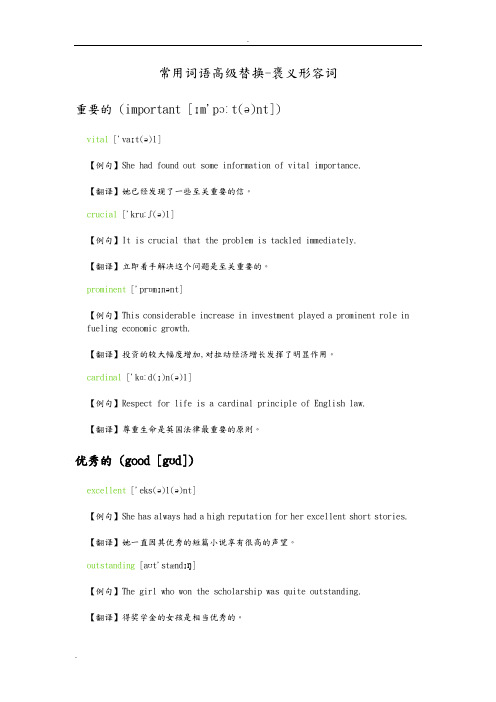
常用词语高级替换-褒义形容词重要的 (important [ɪm'pɔːt(ə)nt])vital ['vaɪt(ə)l]【例句】She had found out some information of vital importance.【翻译】她已经发现了一些至关重要的信。
crucial ['kruːʃ(ə)l]【例句】It is crucial that the problem is tackled immediately.【翻译】立即着手解决这个问题是至关重要的。
prominent ['prɒmɪnənt]【例句】This considerable increase in investment played a prominent role in fueling economic growth.【翻译】投资的较大幅度增加,对拉动经济增长发挥了明显作用。
cardinal ['kɑːd(ɪ)n(ə)l]【例句】Respect for life is a cardinal principle of English law.【翻译】尊重生命是英国法律最重要的原则。
优秀的 (good [gʊd])excellent ['eks(ə)l(ə)nt]【例句】She has always had a high reputation for her excellent short stories.【翻译】她一直因其优秀的短篇小说享有很高的声望。
outstanding [aʊt'stændɪŋ]【例句】The girl who won the scholarship was quite outstanding.【翻译】得奖学金的女孩是相当优秀的。
extraordinary [ɪkˈstrɔːdnri]【例句】Her strength of will was extraordinary.【翻译】她的意志力是非凡的。
工作方案替换词

工作方案替换词工作方案,是为了解决特定问题或实现特定目标而制定的一系列操作步骤和策略的总称。
在实际工作中,有时需要替换某些词语,以达到更加准确、明确、流畅的表达。
本文将探讨工作方案中常见的替换词,旨在提高文档的质量和可读性。
一、替换表达目的的词语1. 提出方案 -> 提议方案、提供方案、建议方案、制定方案、设计方案2. 实施方案 -> 履行方案、执行方案、落实方案、实践方案、采取方案3. 评估方案 -> 检验方案、审查方案、审议方案、审查方案、评价方案4. 调整方案 -> 修改方案、调整计划、变更方案、微调方案、修订方案5. 终止方案 -> 终结方案、废止方案、撤销方案、中止方案、终结方案二、替换描述方式的词语1. 详细描述 -> 全面介绍、彻底阐述、具体说明、细致概述、完整呈现2. 简要概述 -> 简洁概括、扼要陈述、精炼概述、简明扼要、简练概述3. 具体步骤 -> 具体措施、详细步骤、具体行动、细致计划、详细操作4. 完成时间 -> 完工时限、截止日期、交付时间、完成期限、工期要求5. 优势和劣势-> 优点和缺点、利与弊、长处和短处、优点和不足、优势和限制三、替换过渡词和链接词1. 首先、其次、最后 -> 第一、第二、最后2. 此外、而且、另外 -> 另外、并且、还有3. 同时、然后、随后 -> 接着、紧接着、随后4. 因此、所以、因而 -> 因此、故此、所以5. 虽然、但是、然而 -> 尽管、然而、可是四、替换描述程度和重要性的词语1. 非常重要 -> 至关重要、十分重要、极其重要、重中之重2. 较为重要 -> 相当重要、比较重要、重要性较高、较重要3. 一般重要 -> 一般重要、普通重要、一般的重要性、较一般重要4. 不太重要 -> 较不重要、较为次要、相对不重要、次要的5. 微不足道 -> 微乎其微、微不足道、可忽略不计、几乎没有五、替换表达建议和意见的词语1. 建议 -> 提议、建议、建议、提供建议、提出意见2. 建议采纳 -> 采纳建议、接受建议、采纳意见、接受意见、同意建议3. 考虑意见 -> 考虑建议、思考意见、充分考虑、综合意见、综合建议4. 弃用意见 -> 不采纳意见、不接受建议、不予考虑、拒绝建议、否决意见5. 提供参考 -> 提供参考、供参考、提供借鉴、作为参考、给出建议本文简要介绍了工作方案中常见的替换词,包括表达目的、描述方式、过渡和链接、程度和重要性、建议和意见等方面。
助力 写材料替换词语

助力写材料替换词语
在写材料时,我们通常需要替换一些词语以使内容更丰富、更具有表达力。
以下是一些可以用于替换常见词语的词汇:
1. 替代“非常”:十分、极度、万分、异常
2. 替代“好”:出色、优异、卓越、非凡
3. 替代“重要”:关键、首要、重大、紧要
4. 替代“尝试”:试验、考验、挑战、检验
5. 替代“看”:观察、审视、注视、注目
6. 替代“做”:进行、开展、推进、实施
7. 替代“很多”:众多、大批、大群、浩繁
8. 替代“开始”:起始、开局、启动、肇始
9. 替代“继续”:持续、接续、延续、连绵
10. 替代“说”:表明、表示、表现、阐述
以上是一些常用的替换词语,当然,在写作时还需要根据语境和具体含义来选择最恰当的词语。
公文词语“利剑”的三个字同义替换
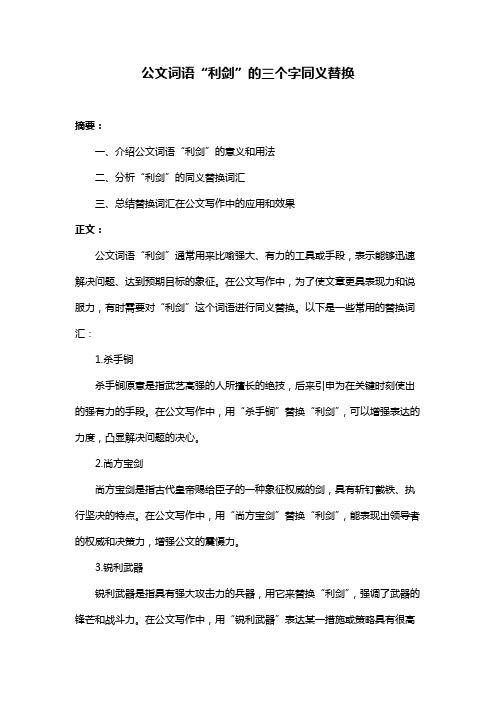
公文词语“利剑”的三个字同义替换
摘要:
一、介绍公文词语“利剑”的意义和用法
二、分析“利剑”的同义替换词汇
三、总结替换词汇在公文写作中的应用和效果
正文:
公文词语“利剑”通常用来比喻强大、有力的工具或手段,表示能够迅速解决问题、达到预期目标的象征。
在公文写作中,为了使文章更具表现力和说服力,有时需要对“利剑”这个词语进行同义替换。
以下是一些常用的替换词汇:
1.杀手锏
杀手锏原意是指武艺高强的人所擅长的绝技,后来引申为在关键时刻使出的强有力的手段。
在公文写作中,用“杀手锏”替换“利剑”,可以增强表达的力度,凸显解决问题的决心。
2.尚方宝剑
尚方宝剑是指古代皇帝赐给臣子的一种象征权威的剑,具有斩钉截铁、执行坚决的特点。
在公文写作中,用“尚方宝剑”替换“利剑”,能表现出领导者的权威和决策力,增强公文的震慑力。
3.锐利武器
锐利武器是指具有强大攻击力的兵器,用它来替换“利剑”,强调了武器的锋芒和战斗力。
在公文写作中,用“锐利武器”表达某一措施或策略具有很高
的成效和威力。
总之,在公文写作中,对“利剑”的同义替换能够丰富词语表达,增强文章的表现力和说服力。
变问句的口诀

变问句的口诀介绍问句是一种提问方式,用于获取信息或引起对话。
在语言表达中,常常需要将陈述句转变为问句,以增强表达效果或引起对方的关注。
变问句的口诀是一种帮助人们快速准确地将陈述句转变为问句的技巧或规律。
本文将介绍变问句的口诀,希望能够帮助读者更好地掌握这一技巧。
变问句的基本原则要想熟练地变成问句,首先需要掌握以下几个基本原则:1.疑问词引导:疑问词是变问句的重要工具,通过引导疑问词的使用,可以将陈述句转变为问句。
常见的疑问词有:谁、什么、哪里、为什么、如何等。
2.语序倒置:在变成问句时,常常需要将陈述句的语序进行倒置,将主语和谓语动词调换位置。
3.词语替换:为了使问题更有针对性或表达更加准确,有时需要对原句中的词语进行替换,例如替换名词、动词等。
4.语气变化:变成问句后,需要调整语气,使问题更具疑问或探询的意味,一般通过使用疑问词、加入助动词或借助语气词等方式实现。
通过掌握以上基本原则,可以更加灵活地将陈述句转变为问句,并能够在日常交流中更好地应用。
变问句的具体口诀变问句的口诀可以总结为以下几个方面:变问句的疑问词引导在变成问句的过程中,疑问词是非常重要的引导工具。
通过引入疑问词,可以使问题变得更加具体明确。
以下是常见的疑问词和其对应的引导问题的口诀:1.谁:指人称(第三人称),谓语在前,主语在后。
例句:他试图做什么?→ 谁试图做什么?2.什么:指事物,谓语在前,主语在后。
例句:他喜欢做什么?→ 什么事他喜欢做?3.哪里:指地点,倒装词组主谓不离开。
例句:他在哪里生活?→ 在哪里他生活?4.为什么:指原因,否定句加反义词。
例句:他喜欢看书是为什么?→ 他喜欢看书为什么不?5.如何:指方式,谓语在前,主语在后。
例句:他如何取得成功?→ 如何他取得成功?变问句的合并替换在变成问句的过程中,有时需要对原句中的词语进行替换,以使问题更具针对性或精确表达。
以下是常见的词语替换的口诀:1.具体名词替换,如:人、物、地方等。
- 1、下载文档前请自行甄别文档内容的完整性,平台不提供额外的编辑、内容补充、找答案等附加服务。
- 2、"仅部分预览"的文档,不可在线预览部分如存在完整性等问题,可反馈申请退款(可完整预览的文档不适用该条件!)。
- 3、如文档侵犯您的权益,请联系客服反馈,我们会尽快为您处理(人工客服工作时间:9:00-18:30)。
常见的词语替换almost nearly a little a bitaround all over be like look like bright clever begin startbeside next to be in be at homebe quick hurry up be out be away come from be from fail not passcross go across hard difficultlast go on hurry walk quickly hardly almost not hurry up go quickly expensive dear look out be careful must have to on aboutover more than wear be inwhy what … for stop give upthanks to because of join take part inas soon as possible as soon as sb canbe weak in be not at good atcatch up with not fall behindhave a good time enjoy oneselfa lot of lots of ; many / muchat last in the end ; finallyat the moment nowhold on wait a momentjust now a moment agoleave go away (from)reach arrive in /at ; get toprefer … to… like … better than …spend … on pay … fortake a look have a lookwalk on go on walkinggo to sleep get to sleep / fall asleepwalk to … go to … on foottake a bus catch a buslook after take (good) care ofhear from receive / get a letter frombe filled with be full offly to… go to … by airreturn 1)come back 2) give backteach oneself learn … by oneselfat once right now(现在) /right away(立刻)练习选出与划线部分意思相同或相近的一项( )1.Liu Ying is like her twin sister.A. likesB. lovesC. looks like( )2. You must drink a lot of water every day.A. manyB. muchC. a little( )3.Most of the teachers in our school are from South China.A. lived inB. get back fromC. come from( )4.She took care of her grandpa when she was free. A. looked after B. looked for C. gave medicine to( )5.Are you sure he is able to do the work by himself.A. mustB. has toC. can( )6.Mum, I’m hungry. Can I have some cakes?A. drinkB. eatC. play( )7.Jack, please come and sit by the teacher.A. beforeB. nearC. past( )8.Summer is coming. The weather will become hotter and hotter.A. catchB. getC. feel( )9.Excuse me, can you tell me the way to the shop?A. answerB. showC. give( )10.He didn’t bring the book here. He had to go home to get it. A. could B. may C. must( )11.Hello, James. Nice to see you.A. catchB. meetC. watch( )12.I don’t understand his words.A. what he toldB. what he saidC. that he talked( )13.They came here by air.A. by bikeB. by planeC. by bus( )14. Glad to see you again.A. SorryB. NiceC. Bad( )15.Can I use your bike? Mine is not here.A. lendB. borrowC. get( )16.Are you going to swim this afternoon.A. has a swimB. have a swimC. swimming( )17.I’m not free tonight.A. hungryB. lateC. busy( )18.Don’t worry. I’ll be back in a minute.A. very soonB. fastC. quick( )19.Summer follows spring.A. comes beforeB. comes afterC. is under( )20.I’ll get a new dictionary soon.A. takeB. sellC. buy( )21.When did the students get to the factory yesterday?A. cameB. arrivedC. reach( )22.They were quite pleased to see each other again.A. pleaseB. goodC. glad( )23.The meeting will be held at a quarter to eight.A. 8:15B. 7:45C. 7:15( )24.The students had a good time in the winter holiday.A. enjoyed themselvesB. enjoyed themC. had no time( )25.The shirt is very nice. I’ll take it.A. tryB. buyC. sell( )26.How is the weather today?A. What’s the weather likeB. What was it likeC. What’s the weather looks like( )27.Mr. Li will take me to the park if he is free next Sunday. A. will be free. B. has time C. had time( )28.He prefers apples to oranges.A. likes ; than otherB. likes ; better thanC. doesn’t like ; so much( )29.She doesn’t have to worry about he illness.A. needn’tB. can’tC. mustn’t( )30. He had to attend the party by himself.A. aloneB. only heC. lonely( )31.He said nothing at that time.A. make noiseB. kept silentC. took his seat( )32.There were still quite a few people in the street that evening.A. not manyB. manyC. much( )33.We’ll held a class meeting tomorrow.A. haveB. giveC. put( )34.The girl was so weak that she didn’t catch up with others. A. fell behind B. tried to hold C. ran after( )35. He prefers apples to oranges.A. likes; than otherB. likes ; as much asC. likes ; better than( )36.The building has been there for a century.A. a short timeB. a long timeC. a hundred years.( )37.Mr Smith flew to London yesterday.A. went to London by trainB. went to London by busC. went to London by plane( )38.Mike is weak in Chinese because he missed so many lessons.A. likesB. does well inC. is not good at( )39.Tom hasn’t heard from his parents for a long time.A. listened toB. write a letter toC. received any letters from( )40.We wanted to know when we would have an English test. A. wanted to see B. got to knowC. wondered( )41.Every body says he is a bright boy.A. braveB. cleverC. tall( )42.Mary is wearing a red dress today.A. onB. inC. putting on( )43.Both my brother and I like the picture very much.A. HeB. WeC. I( )44. The doctor asked him to give up smoking.A. give inB. stopC. go on( )45.Li Lei got up early last Sunday and Jim got up early, too. A. so was Jim B. so did Jim C. Jim did so。
